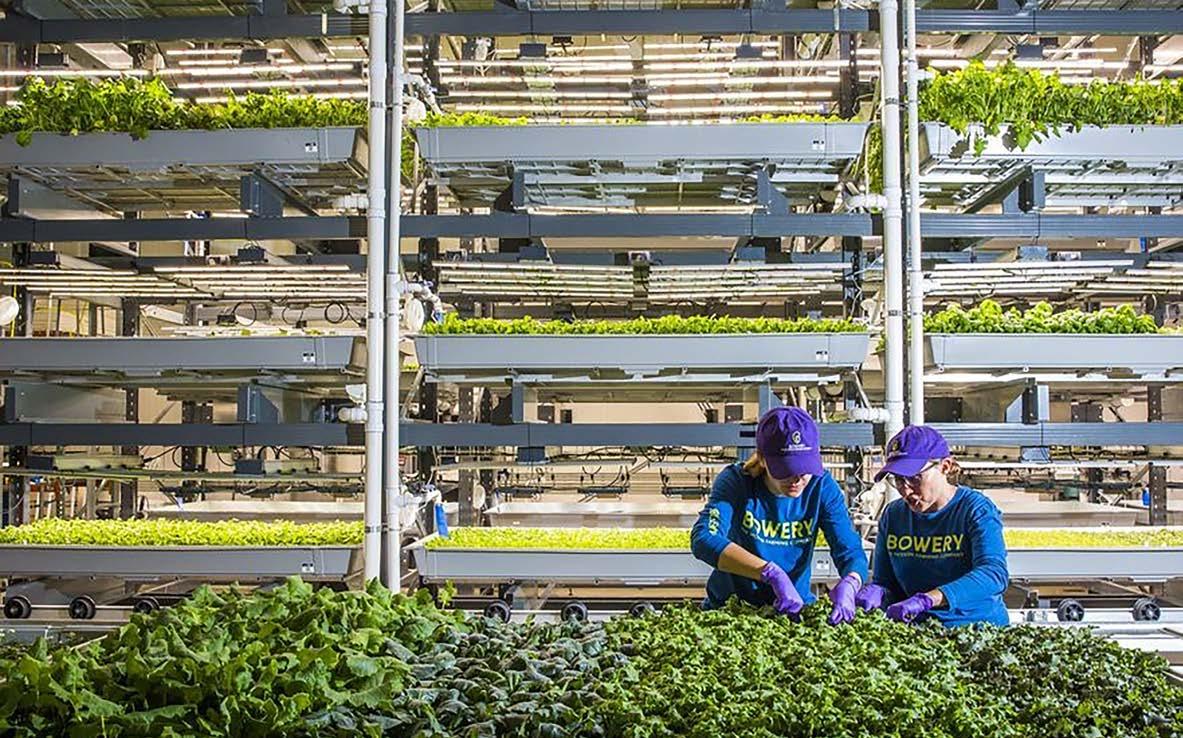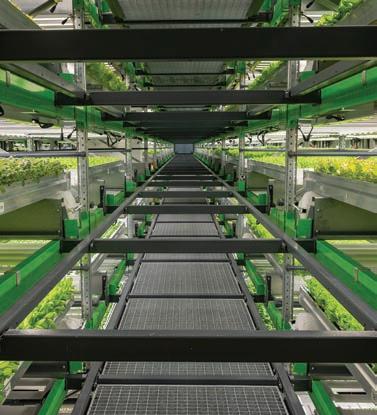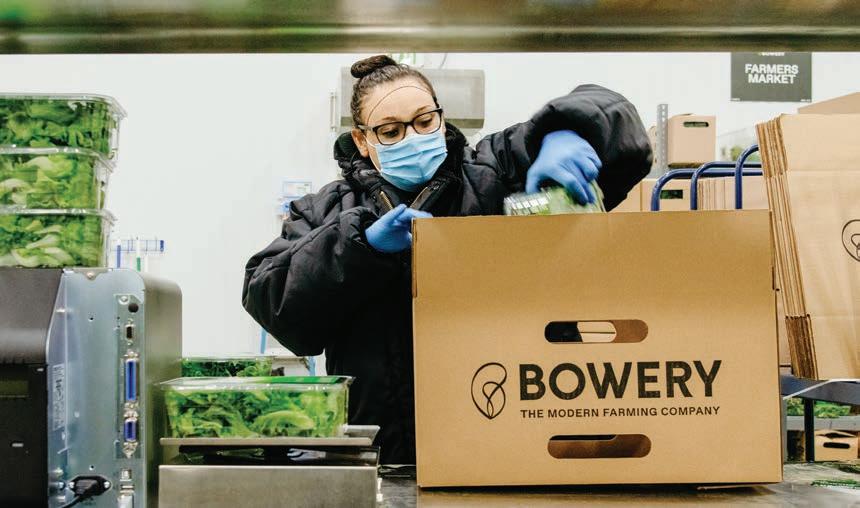
6 minute read
Inside the Country’s Largest Vertical Farming Facility

The Bowery warehouse near Route 412 and Interstate 78 in Bethlehem looks a lot like the many other warehouses that dot the Lehigh Valley landscape. But those similarities begin to fade away as soon as you step inside the place. True, there are some of the same things you’d expect to see at, say, an Amazon facility: machinery, conveyor belts, even robots going about their business. But this 156,000-square-foot building on old Bethlehem Steel land in Lehigh Valley Industrial Park VII isn’t in the business of satisfying the seemingly insatiable digital demands of our nation. It’s a farm.
The NYC-based Bowery Farming bills itself as the largest vertical farming company in the United States. Founded in 2015 by Irving Fain, the company takes its name from an old neighborhood in Lower Manhattan in which Dutch immigrants settled in the seventeenth century. “Bouwerij” (the old Dutch word for farm) became “Bowery.” Bowery Farming’s mission is to reimagine farming from the ground up to address threats to our global food supply that continue to emerge. “If we’ve learned anything from the past two years, it is that we are in a period of unprecedented disruption and uncertainty across our climate and geopolitical circumstances, which unfortunately is going to persist,” Fain said in a news release heralding the opening of the Bethlehem farm in May of 2022, an event that drew then-Governor Tom Wolf and a gaggle of local dignitaries.
Bowery represents the Lehigh Valley’s first major foray into this type of “outside-thebox” farming on a large scale. But for Ben Kant, operations manager at the Bethlehem farm, it’s just another day at the office. He’s been in the controlled environment agriculture industry for more than a decade. He previously ran a greenhouse farm with an aquaponics system, which uses fish to create the plant nutrients, on the west side of Chicago. He then worked with another farming company that operated a larger greenhouse outside of Grand Rapids,
Michigan, before joining the Bowery team in 2019. Kant, who lives in Frenchtown, New Jersey, was charged with getting the Bethlehem location up and running; he likens it to overseeing the construction of a home—coordinating contractors, assembling a team, handling the budget and making sure the infrastructure and machinery are in place and working as they should so the growing can commence.
Vertical farming isn’t exactly a new concept. According to Guinness World Records, the world’s first commercial vertical farm opened in Singapore in 2012, but the idea of looking upward instead of outward when it comes to plants and greenery dates back to ancient times. And the Aztecs were using a form of hydroponic farming—growing plants with a water-based nutrient solution rather than traditional soil—in the 1100s.
But according to several sources, the term “vertical farming” wasn’t officially coined until 1915 by American geologist Gilbert Ellis Bailey. The movement has really started to pick up steam in the U.S. over the past 10 years. That’s probably because of the obvious advantages of operating a farm that is not subject to Mother Nature’s unpredictable whims. “What’s amazing about our farms is that we can drop them in any climate, anywhere around the world that will support the systems within the farms,” Kant says. “We just need some infrastructure. Then we can grow fresh produce.”
Bowery says its Bethlehem farm is powered by 100-percent renewable energy. It uses a water recapture and filtration system that can harness and reuse irrigation water. And, since growing conditions can be so closely controlled, this is a farm that works smarter, not harder.

“We’re really 100 times more productive than the traditional footprint of land with our crops,” Kant says. Crop yields per square foot are much higher at Bowery than at a typical commercial farm. And the assists Bowery gets from its carefully honed operating systems, robotics and AI mean the back-breaking work that has worn down farmers for generations isn’t so backbreaking. “You don’t have to be out in the field all day, hunched over, picking stuff off the ground,” Kant says.
That’s good news for Bowery’s hourly employees, or “modern farmers” as the company likes to call them.
Crystal Toribio of Whitehall Township is one of about 70 workers who help to keep things humming along at the Bethlehem farm. She had no background in agriculture when she applied for a job with Bowery. “I was just looking for a change,” she said. “I took a chance outside my comfort zone.” Toribio, who is now a team leader, can recall her first impressions as she got the lay of the land inside the massive warehouse: “A lot of conveyance. There’s a lot of metal, a lot of moving parts. When you first go in there, it’s a shocking experience.”
It’s true. This isn’t your grandfather’s farm. Kant describes the grow room as a giant filing cabinet of plants; think tall towers stacked with trays of plants from floor to ceiling. “Everything that the plants need is provided,” he says. “They get light, they get air, water with nutrients.”
All the while, the plants are being monitored by cameras and sensors. That data is used to feed the operating system information about the conditions that are optimal for the various crops to thrive. When it’s harvesting time, robots called carriers take the trays of plants to the processing floor. There are also rooms for seeding and transplanting in different parts of the warehouse. If you’re thinking this sounds a little like science fiction, you’re not alone. “Sometimes I feel like I’m on a spaceship at this facility,” Kant says. “It is absolutely like working in the future.”
The produce is packaged on site, put on pallets and sent to wherever it needs to go. Bowery sells its food in more than 1,400 retail locations and e-commerce platforms. Locally that includes supermarkets like Weis, ShopRite, Whole Foods and Walmart. But Bowery doesn’t just deal with chains. It also works with smaller, independent grocers, like Gerrity’s in Bethlehem. Kant says community connection is important, so Bowery also has partnered with nonprofit food banks like Second Harvest and Philabundance to get its produce into the hands of those who need it the most.

The crops grown at each Bowery farm are dependent on customer demand. The Bethlehem location is focused on a variety of leafy greens as well as herbs like basil, parsley and cilantro. According to Bowery’s website, although its products are not USDA Organic certified, its produce is pesticide-free, grown with non-GMO seeds and is fully traceable from seed to shelf.
While the future of vertical farming seems bright, a few storm clouds have gathered on the horizon. According to Bloomberg, some farms struggled or even closed in 2022, including Pittsburghbased Fifth Season. Some critics say vertical farming doesn’t live up to its hype. Among their gripes: start-up costs are usually hefty, and even when the farms are operational, they eat up a lot of energy and tend to be limited in what they can produce. Currently herbs, greens, tomatoes and strawberries make up the bulk of the harvest; Vertical Farming Planet says those plants tend to be the easiest and the most economical to grow. It is possible to branch out, but growing things like root vegetables would require a different setup and maintenance system. Fruiting crops that need insect pollination to produce also present a new set of challenges.

Even if some other vertical farms have stuttered, Bowery is showing no sig ns of slowing down. Besides its Bethlehem location, it also operates farms in Kearny, New Jersey, and Nottingham, Maryland, with plans to open new farms in Texas and Georgia this year. Bowery has started growing strawberries at its Kearny farm and hopes that berries will serve as a road map forward with other fruiting and vine crops.

Whether vertical farming is truly the farming method of the future remains to be seen. But both Toribio and Kant are very invested in what’s blooming on Feather Way in Bethlehem. “You learn different things as each day comes and goes,” says Toribio. And there’s no denying that Bowery’s stated mission is an earnest one. “One of my core career goals is to improve the fresh food system in America and in the world, to grow fresh food for my community. And Bowery does that,” Kant says. boweryfarming.com
BARTON’S AUCTION
BARTONSAUCTION
Featuring finely curated sales with an emphasis on accessibility and attentive customer service, Barton’s Auction is the Lehigh Valley’s premier location to buy and sell vintage designer furniture and decorative art. Visit online for news about the upcoming auctions!

550 S. Green St., Nazareth by appointment only 484.546.2442 | bartonsauction.com
Eight Oaks Farm Distillery
EIGHTOAKSDISTILLERY
Eight Oaks Farm Distillery grows what they drink: award-winning Pennsylvania craft whiskeys and spirits. Made from grain they grow in the Lehigh Valley, Eight Oaks’ original American spirits are crafted to revive the tradition and lift the spirits of everyone who shares in their enjoyment.
7189 Route 309, New Tripoli 484.387.5287 | eightoaksdistillery.com











